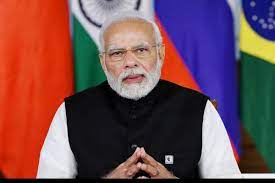Dr. Gyan Pathak
With announcement of Vidhan Sabha Elections in five states – Mizoram, Chhattisgarh, Madhya Pradesh, Rajasthan, and Telangana – by the Election Commission of India today, the pre-election campaigns end with the Model Code of Conduct for the political parties and their leaders coming into operation. Political narrative emerged so far underwent several twists and turns signalling bad omens for the country, if followed by the political parties, would precipitate troubles much faster that one can imagine.
The political narrative so far revolved round five aspects – development, freebies, social justice, communalism, and North India vs South India. These are likely to dominate the election campaigns in the coming weeks. Every narrative has its pros and cons, but under temptation to polarize votes, these can potentially be dangerous.
Projects and schemes costing thousands of crores have been launched in the last three months by the PM Narendra Modi led Union Government in the election bound states to give boost to the development narrative of the BJP. The events were organized by and costs borne by the Central government. However, the morality did not prevent the prime minister to use these events for political campaigns for personal gain or for the benefit of BJP.
It was found to be a compulsion for the BJP, since in every poll bound state, the BJP units are almost vertically split into factions. The party was unable to select its PM face in any of the state, and hence it decided for “collective leadership”. As against this Congress’s CM face in Chhattisgarh is CM Bhupesh Baghel, in Madhya Pradesh Kamal Nath, and in Rajasthan, CM Ashok Gehlot. PM Modi will have to face BRS’s CM K Chandrashekhar Rao in Telangana.
It is, effectively, PM vs CMs in all these four states, since PM Narendra Modi is the face on whose name the state election battles would be fought. The purpose of the launch of numerous projects and schemes was to show that PM Modi is the only person who cares for the people, and no one else. However, people know, it is just a pre-election development narrative, which has no real worth.
PM Narendra Modi has therefore been pitted against chief ministers of the Chhattisgarh, Rajasthan, and Telangana. The ruling Congress in Chhattisgarh and Rajasthan have also scripted their even more attractive development narratives for a long time. Similar is the case with BRS in Telangana. Modi’s development narrative is centred on wealth creation, while the opposition’s development narratives are centering on Human Development.
The narratives around freebies are even more remarkable. PM Modi goes on promising freebies in the name of social welfare, while he tries to ridicules the opposition on this issue by calling their social welfare promises as distributing ‘revadis’ that would allegedly ruin the states’ exchequers. The political narrative behind social welfare and freebies have become murkier, given the track record of the PM Modi led government that had written off about Rs15 lakh crore of loans to big corporates in the last nine years, but has been reducing the subsidies and other social security benefits to the common people, and even reduced budgets for MGNREGA for the current year to only 60,000 crore, ie 18 per cent lower than the previous year budget. Almost entire money has been spent in just six months while thousands of crores are due to the daily wage workers. To save its skin, Centre has lied that it did not release funds due to rampant corruption by the opposition ruled states such as West Bengal, but the reality is that there is no fund in MGNREGA.
The third political narrative revolves round social justice, especially after the Bihar Caste Census 2022 was released recently. Congress has promised in every poll bound states that they would conduct caste census if they come to power, while the BJP has been opposing it. PM Modi has alleged that the opposition has been trying to divide the country on caste. He rather concentrating on OBC identity by accommodating more and more OBC leasers within the party while the opposition pitches for social justice. Congress leader Rahul Gandhi has said “jitni abadi, utna haq” (share must be proportionate to population).
PM Modi has tried to exploit the social justice move in such a way that may lead to worse level of communalism, while alleging the opposition of casteism. If the narrative is not handled carefully, may lead to social rifts on both caste and communal lines in the country.
In a bid to twist the issue, PM Modi has asked what will happen to the earlier statement of former Prime Minister Manmohan Singh who had said that the minorities especially Muslims have the first right on resources of the country. He asked whether the Congress want to reduce the share of Muslims, if the party sticks to proportionate share as pet the population? It implied respective Hindu and Muslim population, and their proportionate share. Obviously, it has communal overtone, given the Hindutva politics of the RSS-BJP, and their political capitalisation on polarisation of Hindu votes. The danger is that the issue of social justice is likely to be converted into escalation of caste and communal politics. (IPA)


